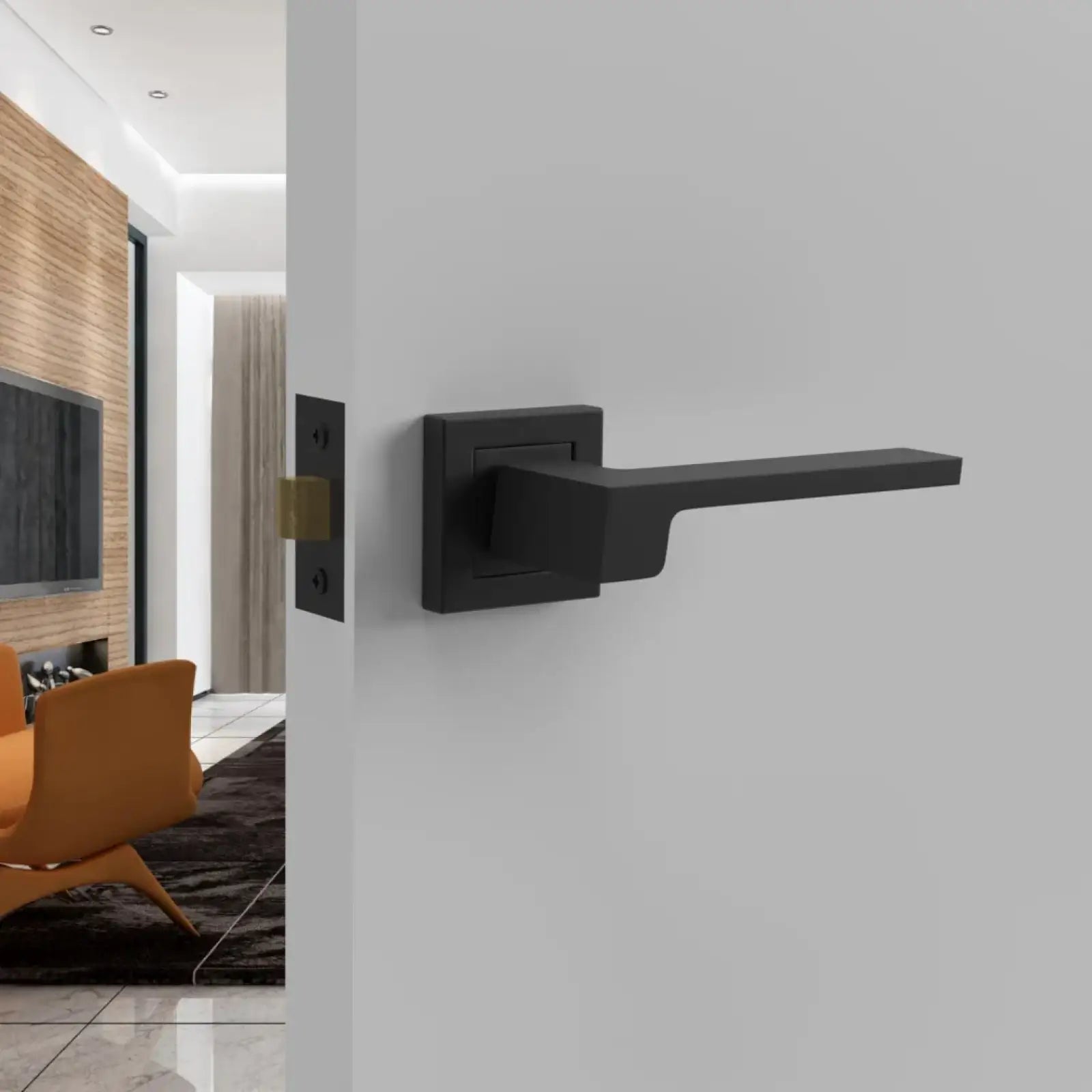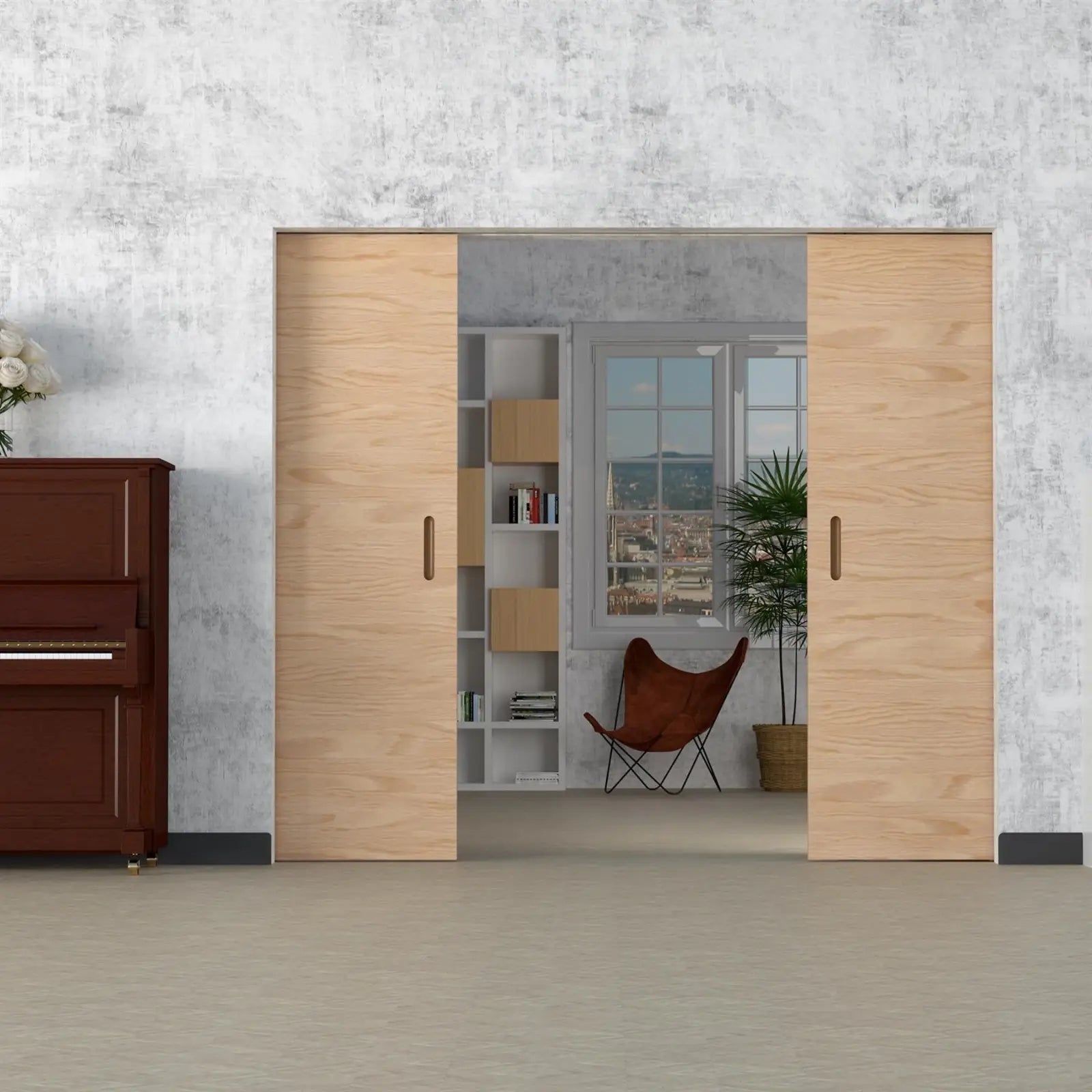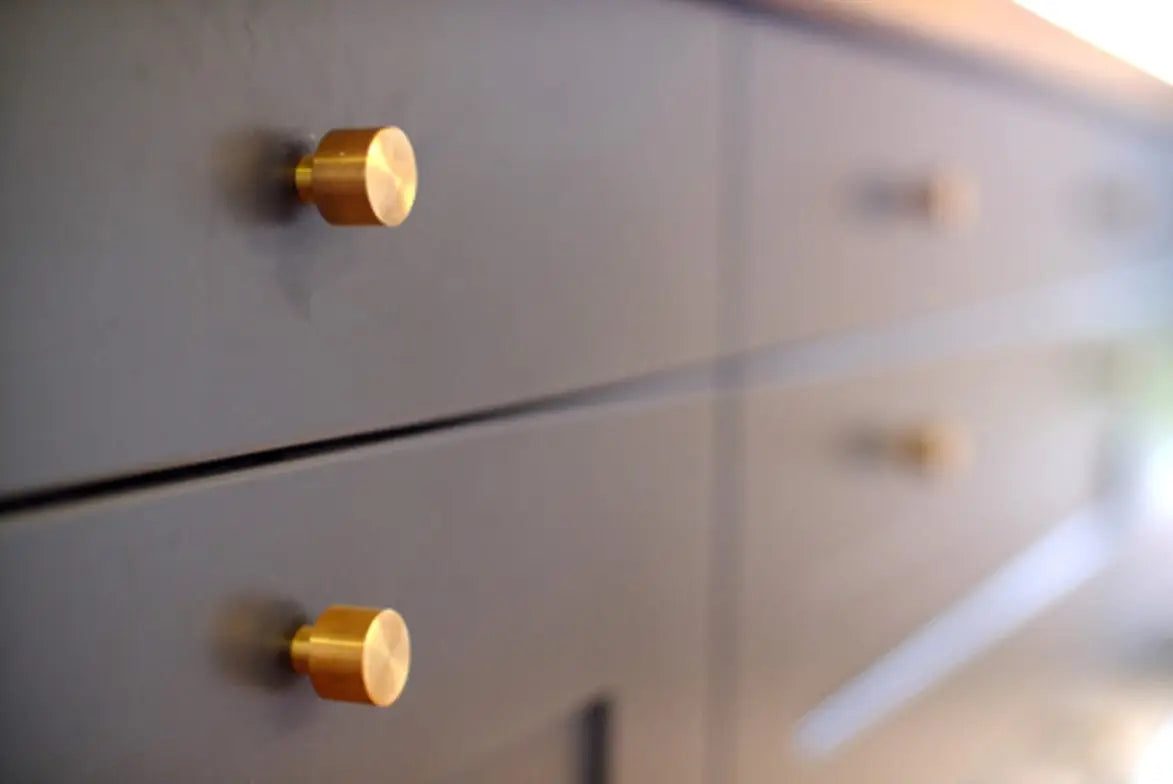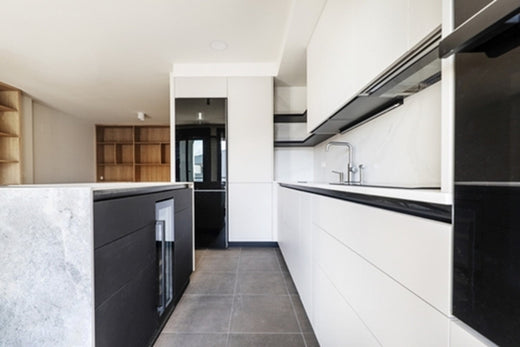Different Types of Door Materials
Whether you're focusing on interior or exterior doors, the material you choose can impact everything from durability to energy efficiency to the optimal types of door handles. This guide will walk you through the most common types of door materials, their pros, and the best options for various areas of your home.

What Are the Most Common Types of Door Materials?
Understanding different types of door materials can help you make informed decisions when upgrading or replacing doors in your home. Interior and exterior doors require different considerations to ensure the best fit for your needs.
Interior Door Material Types
Below, we explore some of the most popular interior door material types, breaking down their durability, sound insulation, energy efficiency, maintenance, and costs. This will help you compare and find the best fit for your home’s needs.
Solid Wood
Solid wood doors are crafted from a variety of different hard and softwoods, such as timber, oak, maple, or pine. Their natural grain and warm tones are a great choice to enhance traditional or rustic interiors. These doors work best in areas like bedrooms and living rooms, where sound insulation and aesthetics are a priority.
- Durability: Solid wood interior doors are highly durable, with the strength to withstand daily use. However, they can warp in high-moisture areas.
- Sound Insulation: Excellent soundproofing makes these doors ideal for rooms where privacy and quiet are important.
- Energy Efficiency: Solid wood offers good insulation, helping to maintain consistent indoor temperatures.
Maintenance: Requires regular upkeep, such as refinishing or staining, to maintain its appearance and durability.
Cost: Solid wood interior doors can range from £55 to over £200 per door.

MDF
Medium-density fibreboard (MDF) is an engineered wood product known for its smooth surface, making it perfect for painting. Its sleek, modern look fits well in contemporary homes. MDF doors are suitable for areas like hallways, where cost-effectiveness and a polished finish are key.
- Durability: MDF is durable but can be prone to swelling in humid conditions.
- Sound Insulation: Provides moderate sound insulation but not as effective as solid wood.
- Energy Efficiency: Offers decent insulation but doesn’t retain heat as well as solid wood.
- Maintenance: Requires minimal maintenance but should be kept dry to prevent damage.
- Cost: More affordable than solid wood, making it a great option for homeowners on a budget.
Hollow Core
Hollow core doors are made with a honeycomb cardboard interior and a thin wood or fibreboard sheet exterior. They have a simple, understated style, making them ideal for less-used rooms like closets or storage areas.
- Durability: Less durable than other options and more susceptible to damage from impact or moisture.
- Sound Insulation: Provides minimal soundproofing, making it less ideal for rooms where privacy is needed.
- Energy Efficiency: Poor insulation properties, meaning they don’t help much in maintaining indoor temperatures.
- Maintenance: Requires little upkeep but can be difficult to repair if damaged.
- Cost: The most budget-friendly option, you can pick up hollow core internal doors for £40 or less.
Solid Core
Solid core doors are made from a wood veneer covering a composite or engineered wood interior. They have the appearance of solid wood but are more affordable. Best suited for high-traffic areas like bathrooms and home offices, where soundproofing and durability are important.
- Durability: More durable than hollow core doors and less prone to warping in humid conditions than solid wood.
- Sound Insulation: Provides good soundproofing, making it a practical choice for busy households.
- Energy Efficiency: Offers better insulation than hollow core doors but not as effective as solid wood.
- Maintenance: Minimal maintenance required, making them a low-effort option for busy households.
- Cost: Prices typically start around £70.
Glass
Glass doors feature large panels of glass framed by wood or metal, offering a sleek, modern look. These doors are perfect for areas where natural light is needed, such as home offices or dining rooms.
- Durability: While elegant, glass can be fragile and prone to breakage if not treated with care.
- Sound Insulation: Provides minimal soundproofing compared to solid options, but frosted or double-glazed glass can help.
- Energy Efficiency: Less energy-efficient than other materials unless double or triple glazing is used.
- Maintenance: Requires regular cleaning to maintain clarity and aesthetic appeal.
Cost: Prices vary depending on the type of glass but can range between £80 to over £250.

Exterior Door Material Types
There are also different types of door materials suited to exterior doors. Below, we highlight the most popular exterior door material types, comparing their security, weather resistance, and energy efficiency.
Solid Wood
Solid wood doors are an excellent option for both interior and exterior use. Their rich, natural grain patterns add warmth and charm, making them a perfect fit for homes ranging from traditional to contemporary styles. These doors can also be customised with a variety of stains or paints, allowing you to create a unique front door that reflects your personal style.
- Security: Solid wood doors are highly secure due to their thickness and strength. They provide a sturdy barrier against forced entry, especially when paired with a quality door lock set for enhanced protection.
- Energy Efficiency: Solid wood doors offer good insulation, helping to maintain a consistent indoor temperature. Their natural density works to block drafts and minimise heat loss, making them an energy-efficient choice for exterior doors.
- Weather Resistance: While solid wood doors are sturdy, they require regular maintenance to protect them from the elements. Applying a sealant or varnish every few years helps prevent moisture damage, warping, and cracking, ensuring your door stays in excellent condition for years to come.

Aluminium
Aluminium doors are made from lightweight yet durable aluminium sheets, often finished with a protective powder coating that comes in various colours. They offer a sleek, modern aesthetic, making them ideal for contemporary homes.
- Security: Aluminium doors are incredibly strong and resistant to impact, making them difficult to break. Their robust construction provides excellent protection against forced entry.
- Energy Efficiency: Aluminium doors typically have an insulating interior, typically made from plastic, that helps improve insulation and keep your home comfortable year-round
- Weather Resistance: Aluminium doors are highly resistant to rust, corrosion, and warping, making them ideal for wet or coastal climates. They require little maintenance beyond occasional cleaning to keep their finish looking fresh.

Composite
Composite doors are made from a mix of materials, including wood, PVC, and insulating foam, designed to offer strength, insulation, and style. They mimic the appearance of traditional wooden doors but with enhanced durability.
- Security: Composite doors are extremely strong and offer excellent resistance to forced entry due to their solid, reinforced core. Their multi-layered construction adds an extra layer of protection for your home.
- Energy Efficiency: These doors are highly energy-efficient, as their insulated core helps maintain consistent indoor temperatures, reducing energy costs. They are one of the best options for keeping your home warm in winter and cool in summer.
- Weather Resistance: Composite doors are designed to withstand harsh weather without warping, cracking, or fading. They require minimal maintenance, needing only occasional cleaning to preserve their finish.
uPVC
uPVC doors are made from unplasticised polyvinyl chloride, a durable and low-maintenance material. They are available in a range of colours and finishes, offering a clean, modern look for both contemporary and traditional homes.
- Security: uPVC doors are reinforced with galvanised iron, aluminium, or carbon fibre for added strength, making them secure against break-ins. Their rigid construction provides a solid, protective barrier for exterior use.
- Energy Efficiency: uPVC doors are excellent insulators, helping to keep your home energy-efficient by reducing heat transfer. This can help lower energy bills, especially in colder climates.
- Weather Resistance: uPVC doors are highly resistant to moisture, rot, and corrosion, making them ideal for wet or humid environments. They require very little maintenance beyond occasional cleaning with a damp cloth.
Steel
Steel doors are made from a solid steel sheet coated with a protective finish, offering unparalleled strength and durability. They have a minimalist, industrial aesthetic that works well in modern or functional home designs.
- Security: Steel doors are incredibly strong, offering the highest level of protection against forced entry. They are nearly impossible to breach, making them a top choice for security-conscious homeowners.
- Energy Efficiency: While steel is not naturally insulating, many steel doors are filled with insulating foam to improve energy efficiency. This helps regulate indoor temperatures and reduces energy consumption.
- Weather Resistance: Steel doors are highly resistant to extreme weather conditions, including rain, wind, and snow. To prevent rust, it's important to maintain the protective finish with periodic repainting as needed.
Fibreglass
Fibreglass doors are made from a durable plastic material reinforced with glass fibres, offering both strength and versatility. They can mimic the appearance of wood while being much more resistant to wear and tear.
- Security: Fibreglass doors are strong and durable, making them highly resistant to break-ins. Their reinforced structure provides excellent protection while maintaining a stylish appearance.
- Energy Efficiency: Fibreglass doors are energy-efficient, offering great insulation thanks to their foam core, which helps reduce heat loss. They keep your home comfortable and help lower energy bills.
- Weather Resistance: Fibreglass doors are highly resistant to extreme weather conditions and won't warp, rot, or crack. They require minimal maintenance, just occasional cleaning to keep them looking fresh.
Glass
Glass doors are made from tempered or reinforced glass panels framed with materials like wood, aluminium, or steel. They offer a sleek, modern aesthetic and allow natural light to flow into your home, creating an open, airy feel.
- Security: Glass doors, especially those made with reinforced or laminated glass, are surprisingly strong and resistant to breakage. However, they may still be less secure than solid materials, making reinforced glass essential for exterior use.
- Energy Efficiency: Double or triple-glazed glass doors offer good insulation, helping to keep your home energy-efficient. The multiple layers reduce heat transfer and prevent drafts from entering your home.
- Weather Resistance: Glass doors can be highly weather-resistant, especially when properly sealed and installed with high-quality glazing. Regular cleaning is necessary to keep the glass clear and free from streaks or dirt buildup

How Do I Choose the Right Interior Door Material?
Choosing the right interior door material depends on your budget, durability needs, and how much maintenance you're willing to commit to. To help, we've highlighted the best options for each consideration:
- Budget: For those on a tight budget, hollow core doors offer an affordable solution without sacrificing basic functionality.
- Longevity: If you’re looking for long-lasting quality, solid wood doors provide exceptional durability and timeless appeal.
- Maintenance: For low maintenance, MDF doors are a great choice, offering a smooth finish that’s easy to clean and resists warping.
Another key factor is the specific area of your home. Solid core doors work well for bedrooms and bathrooms where soundproofing is important. Glass or MDF doors are ideal for kitchens, dining rooms, and living rooms, offering style and functionality. For high-traffic areas like hallways, solid wood or MDF doors are both durable and stylish options.
Are Hollow-Core Doors Worth It?
Hollow-core doors are worth considering if you’re on a budget or don’t need soundproofing in certain areas. They are lightweight and easy to install, making them perfect for closets or pantries. However, they don’t offer the same level of durability or insulation as solid or solid core doors, so they may not be the best choice for every room.
What Is the Best Type of Front Door Material?
The best type of front door material depends on your priorities. If you’re looking for a front door that combines security, curb appeal, and energy efficiency, you can’t go wrong with a solid wood door or aluminium door. Steel and fibreglass are also top contenders for front doors, providing both strength and style, with less upkeep than solid wood doors.
What Are the Different Door Frame Material Types?
Choosing the right door frame material is just as crucial as selecting the door itself, as it impacts durability, aesthetics, and insulation. Here are the most common types:
- Wood: Wooden door frames are a classic choice, offering a natural look that complements both traditional and modern homes. They can be stained or painted for customisation but require regular maintenance to prevent warping or rotting. Wood provides excellent insulation, making it a reliable option for both interior and exterior doors.
- Aluminium: Aluminium frames are sleek and modern, often used in contemporary homes for their minimalist aesthetic. They are lightweight, highly durable, and resistant to rust, making them a low-maintenance option. They don’t offer the same level of insulation as wood or uPVC, so additional insulation may be needed.
- uPVC: uPVC frames are a popular budget-friendly option, known for their durability and low maintenance. They are resistant to weathering and do not warp, rot, or require painting, making them ideal for exterior doors. uPVC also offers good insulation, helping to improve the energy efficiency of your home.
FAQs
What factors should I consider when selecting a door material?
When choosing a door material, consider your budget, the door’s location, and your home’s style. Durability, insulation, and maintenance requirements are also key factors.
Can I paint or stain any type of door material?
Most door materials can be painted or stained, but some, like MDF or solid wood, offer more flexibility. Always check the manufacturer's recommendations before applying a finish.
How do I maintain different door materials for longevity?
Regular cleaning and proper sealing help maintain the lifespan of doors. Wood doors require periodic refinishing, while materials like fibreglass and aluminium need minimal maintenance.






